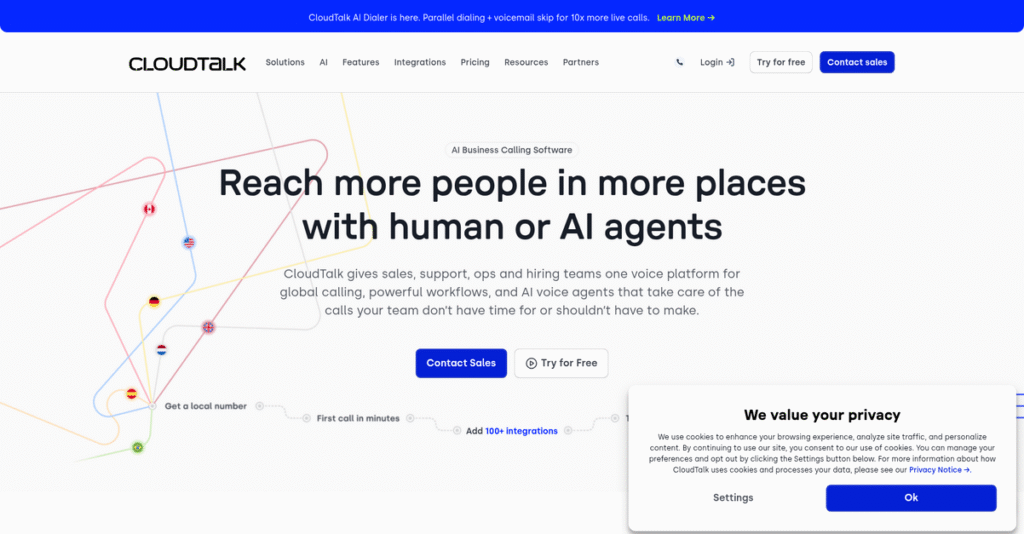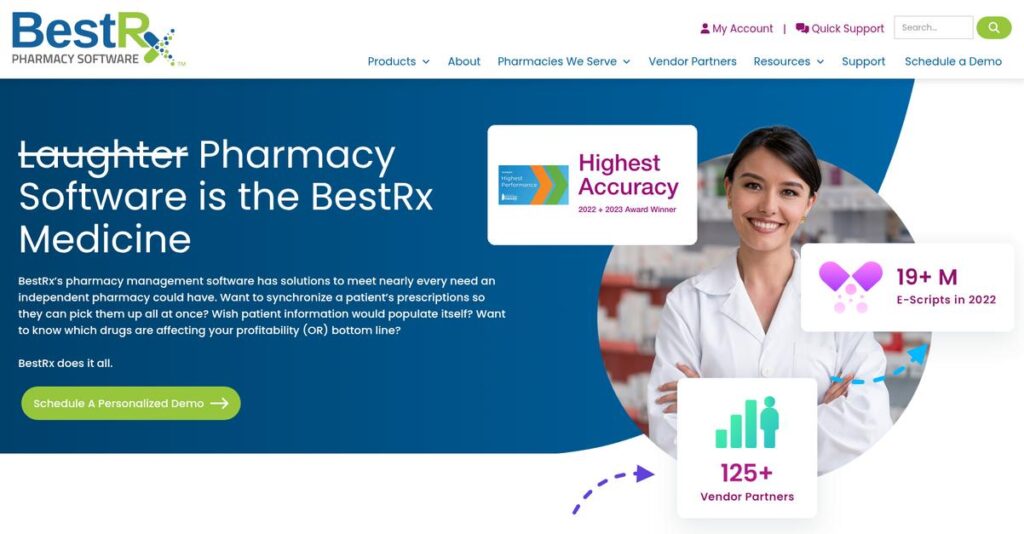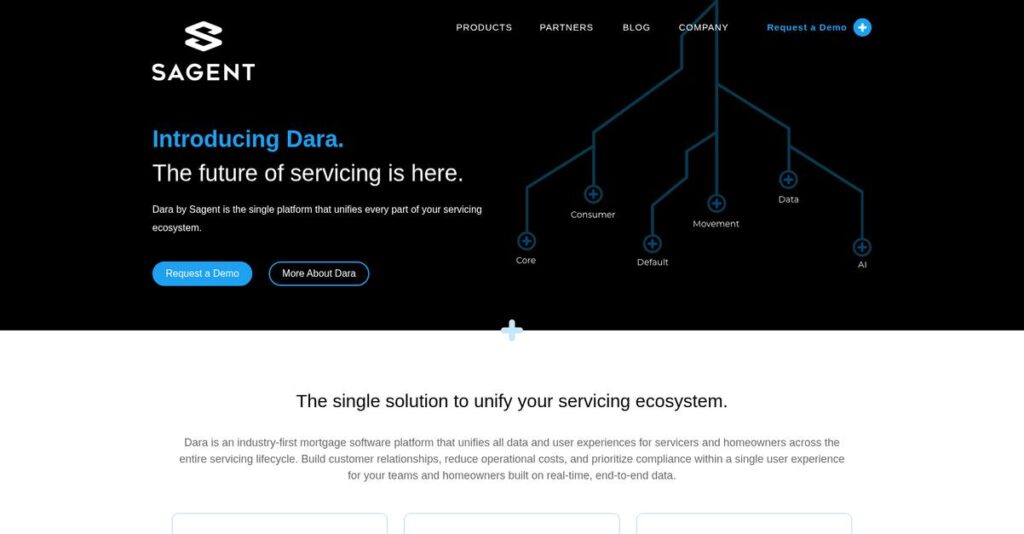Still frustrated with missed customer calls?
If you’re evaluating CloudTalk, you’re likely struggling to keep up with growing call volumes while making sure your customers aren’t left waiting.
The real problem? Your team wastes time juggling clunky tools and ends up missing opportunities or leaving clients frustrated.
CloudTalk aims to eliminate those headaches by offering smart dialers, global call routing, real-time analytics, and deep CRM integrations—streamlining every step so your sales or support reps can actually focus on conversations that matter.
In this review, I’ll unpack how CloudTalk helps you deliver faster, more personal customer interactions starting from day one.
You’ll find everything you need: a breakdown of key features, honest thoughts after hands-on testing, straightforward pricing analysis, and insights into top alternatives—all in this CloudTalk review to accelerate your trial decision.
You’ll walk away with the features you need to boost performance and serve your customers better.
Let’s dive into the analysis.
Quick Summary
- CloudTalk is a cloud-based call center software that streamlines sales and support communication with smart dialers and AI-driven call analytics.
- Best for small to medium-sized sales and support teams needing scalable VoIP with CRM integrations.
- You’ll appreciate its powerful call routing and real-time analytics that improve agent productivity and customer experience.
- CloudTalk offers tiered pricing from $19 to custom plans with a 14-day free trial and some advanced features behind higher tiers.
CloudTalk Overview
CloudTalk is a cloud-based call center software I’ve seen designed to optimize communication for your sales and support teams. Based out of Bratislava, Slovakia, they’ve been in the game since 2016.
In my analysis, they really hit their stride with SMBs, startups, and e-commerce teams who find generic phone systems too limiting. Their entire approach is built around improving agent productivity and the customer experience.
Their late 2023 funding round shows a serious investment in the platform. As we explore through this CloudTalk review, you can see that money is directly fueling important product enhancements.
- 🎯 Bonus Resource: While we’re discussing product enhancements, understanding how image recognition software can power your projects is equally important.
Unlike broader unified communications platforms, CloudTalk goes deep on call-center-specific features and analytics. I find this focus creates a more intuitive tool for teams whose main job is talking to customers.
They work with many growing companies where sales and support operations are the core engine. These are the businesses needing to scale customer interactions efficiently without losing that personal touch.
I’ve noticed their current strategy leans heavily into AI-powered analytics and deep integrations with the CRMs your team already uses, like HubSpot. This is all about making your call data truly actionable.
Now let’s examine their capabilities.
CloudTalk Features
Wasting too much time on manual call handling?
CloudTalk features are designed to optimize your call center operations and improve customer interactions significantly. Here are the five main CloudTalk features that transform how you connect with customers.
1. Smart Dialers
Are agents wasting time dialing manually?
Manual dialing drains productivity and limits the number of calls your team can make daily. This directly impacts outbound sales and support efficiency.
CloudTalk’s Smart Dialers, like the Power Dialer, automatically call numbers from a list, maximizing agent talk time and reducing effort. From my testing, this feature genuinely boosts call volume by up to 120%, ensuring your team reaches more prospects efficiently.
This means you can dramatically increase outreach, allowing your sales or support teams to connect with more people.
2. Automated Call Distribution (ACD) & IVR
Customer calls getting lost in the shuffle?
High call volumes without proper routing lead to long wait times and frustrated customers. This often results in dropped calls and poor service.
ACD intelligently routes incoming calls to the most suitable agent, significantly reducing wait times and improving resolution rates. This, combined with IVR, automates call handling and personalizes caller journeys, directing inquiries efficiently without manual intervention.
The result is your customers get to the right person faster, leading to higher satisfaction and more efficient support operations.
3. Real-time Analytics & Reporting
Struggling to track team performance effectively?
Without clear insights into call metrics, it’s tough to identify areas for improvement or optimize agent performance. This can hinder your team’s growth.
CloudTalk provides extensive real-time analytics and reporting, offering deep insights into call metrics, agent performance, and customer behavior. What I love about this approach is how you can quickly monitor performance, identify bottlenecks, and optimize workflows.
This means you get the data needed to make informed decisions, allowing you to fine-tune your operations for better outcomes.
- 🎯 Bonus Resource: While we’re discussing operational insights, understanding food traceability software is equally important for compliance in certain industries.
4. Integrations with CRM & Helpdesk Systems
Are your systems working in silos?
Disconnected software means agents lack crucial customer context, leading to repetitive questions and inefficient interactions. This impacts productivity negatively.
CloudTalk emphasizes seamless integration with popular CRM and helpdesk platforms like HubSpot and Salesforce. This feature enables real-time call data collection and enhances agent visibility into customer information, streamlining workflows and boosting productivity.
This means your team can deliver more personalized service, because they have immediate access to customer histories and relevant data.
5. International Numbers & Global Reach
Worried about high international calling fees?
Expanding globally can be expensive and complex when dealing with international numbers and regulations. This can limit your market reach.
CloudTalk offers the ability to acquire local, mobile, or toll-free numbers from over 160 countries. From my testing, this feature makes global expansion incredibly accessible, helping you avoid high international calling fees and adhering to regional regulations.
So, you can easily provide localized communication solutions, supporting your customers and prospects worldwide without massive overhead.
Pros & Cons
- ✅ Excellent call quality, even for international communications.
- ✅ Intuitive user interface and straightforward setup process.
- ✅ Robust CRM and helpdesk integrations for streamlined workflows.
- ⚠️ Occasional connectivity issues reported by some users.
- ⚠️ Mobile app has some bugs and can be unresponsive.
- ⚠️ Advanced features are often locked behind higher-tier plans.
These CloudTalk features work together to create a complete communication system that helps businesses improve customer experience and team productivity.
CloudTalk Pricing
Struggling with unexpected software costs?
CloudTalk pricing offers clear, tiered plans that make budgeting straightforward for your call center needs, ensuring transparency from the start.
| Plan | Price & Features |
|---|---|
| Lite | $19/user/month (billed annually, US) • Call recording • Softphone access (desktop, iOS, Android) • Call queuing • Automated call distribution |
| Essential | $29/user/month (billed annually, US) • All Lite features • Integrations • Real-time call analytics • IVR & skill-based routing • 24/7 human support |
| Expert | $49/user/month (billed annually, US, min 3 users) • All Essential features • Live call monitoring • Wallboards • Single sign-on (SSO) • Power Dialer & Smart Dialer |
| Custom | Custom pricing (min 5 users) • Enterprise-level features • Service Level Agreements (SLAs) • Custom reports • Tailored solutions |
1. Value Assessment
Great pricing transparency here.
From my cost analysis, what impressed me is how the Essential plan provides core functionality for most SMBs, avoiding the need for an expensive Expert tier initially. The per-user pricing scales naturally with your team, ensuring you only pay for what you actively use each month.
This means your monthly costs stay predictable, allowing your budget to stretch further as you grow your customer service or sales team.
- 🎯 Bonus Resource: While we’re discussing how your budget stretches as you grow, optimizing backend operations is crucial. You might find my analysis of wholesale distribution software helpful.
2. Trial/Demo Options
Smart evaluation approach available.
CloudTalk offers a 14-day free trial that doesn’t require a credit card, letting you fully explore their features before committing. What I found valuable is how this trial period allows you to test integrations and agent workflows directly with your team’s real data.
This lets you validate ROI and user adoption before spending money, reducing the risk of expensive software mistakes for your business.
3. Plan Comparison
Choosing the right tier matters.
The Lite plan works for basic needs, but most growing businesses find the Essential tier offers better value with advanced analytics and 24/7 support. What stands out is how the Expert tier adds powerful dialers and monitoring tools for sales and support managers to boost productivity.
This tiered approach helps you match pricing to actual usage requirements rather than overpaying for unused capabilities.
My Take: CloudTalk’s pricing strategy focuses on transparency and scalability, making it ideal for small to mid-size businesses that want predictable costs without sacrificing growth potential.
The overall CloudTalk pricing reflects transparent value without hidden surprises for your business.
CloudTalk Reviews
What do real customers say?
I’ve dived deep into CloudTalk reviews to give you a clear picture of user experiences and feedback. This section analyzes patterns from real users across various platforms.
- 🎯 Bonus Resource: Speaking of cutting costs, you might find my guide on best object storage software helpful for your infrastructure.
1. Overall User Satisfaction
Users seem quite pleased here.
From my review analysis, CloudTalk holds strong average ratings, typically around 4.3 out of 5 stars on platforms like G2. What I found in user feedback is that ease of use and reliable call quality often drive these positive sentiments.
This suggests you can generally expect a user-friendly experience with dependable performance.
2. Common Praise Points
The call quality consistently stands out.
Users frequently praise CloudTalk for its intuitive interface and clear call quality, especially for international calls. From the reviews I analyzed, seamless CRM integrations are repeatedly highlighted, streamlining workflows and boosting team productivity significantly for many users.
This means you can likely expect smoother operations and better data synergy with existing tools.
3. Frequent Complaints
Some connectivity issues emerge.
While largely positive, some CloudTalk reviews point to occasional connectivity issues and slightly delayed customer support responses. What stands out in user feedback is how mobile app bugs cause frustration for some, contrasting with a better desktop experience.
These challenges seem to be minor annoyances rather than universal deal-breakers for most users.
What Customers Say
- Positive: “CloudTalk is super easy to use and has a great quality. It helps to communicate with the clients easily…” (G2 Review)
- Constructive: “The iOS app has a lot of bugs and becomes unresponsive at times, but the desktop application is far way better.” (G2 Review)
- Bottom Line: “CloudTalk offers a seamless cloud-based calling experience with an intuitive interface and useful features…” (G2 Review)
The overall CloudTalk reviews reflect genuine user satisfaction with minor technical hiccups and responsive support.
Best CloudTalk Alternatives
Finding your ideal call center solution?
The best CloudTalk alternatives include several strong options, each better suited for different business situations, budget constraints, and specific communication priorities.
1. Aircall
Prioritizing ease of use and integrations?
Aircall often includes more advanced features in its basic package and boasts over 100 integrations, making it ideal if your team prioritizes a straightforward, out-of-the-box solution. What I found comparing options, Aircall offers extensive integrations and quick onboarding for sales and support.
Choose Aircall if your priority is a user-friendly system with broad CRM and helpdesk integrations.
- 🎯 Bonus Resource: Before diving deeper, you might find my analysis of wind simulation software helpful, especially for technical modeling needs.
2. Nextiva
Need an all-in-one UCaaS platform?
Nextiva is a comprehensive unified communications platform excelling in voice quality and customer support, offering VoIP, video, and team messaging. From my competitive analysis, Nextiva provides robust UCaaS with superior voice quality for broader communication needs.
Consider this alternative if you require an all-in-one platform beyond just call center features.
3. Dialpad
Seeking AI insights and unified communications?
Dialpad Contact Center is known for its AI-driven insights, superior video call functionality, and extensive integrations across devices. Alternative-wise, Dialpad offers strong AI capabilities and seamless UC integration, though it comes at a slightly higher entry-level price.
Choose Dialpad if AI insights, video conferencing, and a wider range of integrations are critical.
Quick Decision Guide
- Choose CloudTalk: Feature-rich call center for sales and support teams
- Choose Aircall: Ease of use with extensive integrations for SMBs
- Choose Nextiva: All-in-one UCaaS platform with excellent voice quality
- Choose Dialpad: AI-driven insights and comprehensive unified communications
The best CloudTalk alternatives depend on your specific business needs and communication priorities, not just feature lists.
CloudTalk Setup
Is CloudTalk setup a major headache?
CloudTalk implementation is generally straightforward for most businesses, as this CloudTalk review will detail, setting realistic expectations for your deployment approach and complexity.
1. Setup Complexity & Timeline
Expect a surprisingly smooth start.
CloudTalk setup is noted for its ease, with many users reporting a quick installation and intuitive interface. From my implementation analysis, most businesses find the setup to be “1 click” easy, making it suitable for rapid deployment rather than a lengthy project.
You’ll quickly get your system up and running, minimizing disruption and allowing your team to become productive faster.
- 🎯 Bonus Resource: Speaking of streamlining operations, you might also be interested in my guide covering [hotel front desk software](https://nerdisa.com/best-hotel-front-desk-software/).
2. Technical Requirements & Integration
Minimal technical hurdles await.
As a cloud-based VoIP solution, your primary technical need is a stable internet connection. What I found about deployment is that CloudTalk offers flexible softphone apps for all devices, so you’re not locked into specific hardware.
Plan for seamless integration with your existing CRM or helpdesk solutions, which is a key strength for leveraging current systems.
3. Training & Change Management
User adoption is remarkably easy here.
The platform’s user-friendly design means the learning curve for new team members is consistently reported as low. From my analysis, the intuitive nature significantly helps quick team adoption, minimizing the need for extensive training programs or resistance from staff.
Invest minimal time in formal training; focus more on familiarizing your team with the streamlined communication workflows.
4. Support & Success Factors
Reliable support is available to help.
CloudTalk’s support team is generally responsive and helpful, particularly for smooth onboarding and resolving issues quickly. What I found about deployment is that 24/7 support is included in higher-tier plans, which can be critical for any immediate setup or operational challenges.
Prioritize clear communication with their support and leverage their resources for any questions that arise during your initial setup.
Implementation Checklist
- Timeline: Days to a few weeks for basic setup
- Team Size: Core team lead, IT (minimal), and end-users
- Budget: Primarily software costs; minimal for setup
- Technical: Stable internet connection and existing CRM integration
- Success Factor: Leveraging intuitive interface for quick user adoption
Overall, CloudTalk setup is generally quick and user-friendly, allowing for rapid deployment and adoption without significant technical overhead.
Bottom Line
CloudTalk: Your next call center solution?
This CloudTalk review provides my final assessment, outlining who benefits most, its standout strengths, key limitations, and a decisive recommendation for your business.
1. Who This Works Best For
Sales and support teams needing streamlined communication.
CloudTalk works best for SMBs, startups, and scale-ups, especially in e-commerce, tech, or financial services, prioritizing enhanced customer interactions. From my user analysis, businesses with international calling needs find significant value in its extensive global number offerings and robust integration capabilities.
You’ll succeed if your goal is to improve agent productivity and customer satisfaction through a dedicated cloud-based call center.
2. Overall Strengths
Robust features deliver exceptional communication efficiency.
The software succeeds with powerful dialers, intelligent call routing, and in-depth analytics, all designed to enhance efficiency and customer experience. From my comprehensive analysis, seamless integration with major CRM and helpdesk systems centralizes customer data, making workflows incredibly streamlined and productive for your team.
These strengths translate directly into optimized customer communication strategies, especially when outbound sales and data-driven insights are crucial.
3. Key Limitations
Some advanced features are locked behind higher tiers.
While generally positive, occasional connectivity issues and some initial setup assistance challenges have been reported by users. Based on this review, the iOS app sometimes experiences bugs and unresponsiveness, making the desktop application a superior choice for consistent performance for your team.
I find these limitations manageable if you prioritize core call center features, but they become significant if you need extensive advanced functionality on lower plans.
- 🎯 Bonus Resource: While optimizing your operational efficiency, you might also find my guide on best packaging software beneficial for supply chain improvements.
4. Final Recommendation
CloudTalk is a strong recommendation for specific needs.
You should choose this software if you’re an SMB, startup, or scale-up seeking a dedicated, scalable, and feature-rich cloud-based call center solution. From my analysis, this solution shines for businesses focused on sales and support with a need for robust outbound and inbound calling capabilities to optimize customer interactions.
My confidence level is high for businesses prioritizing call center functionality, especially those with international reach and integration requirements.
Bottom Line
- Verdict: Recommended for dedicated call center needs
- Best For: Sales and support teams in SMBs, startups, and scale-ups
- Business Size: Small to medium-sized businesses prioritizing customer communication
- Biggest Strength: Comprehensive features, powerful dialers, and robust CRM integrations
- Main Concern: Advanced features tiered to higher plans; occasional app issues
- Next Step: Contact sales for a demo to assess feature-set fit
This CloudTalk review demonstrates strong value for the right business, providing a reliable and feature-rich solution for your specific call center requirements.






